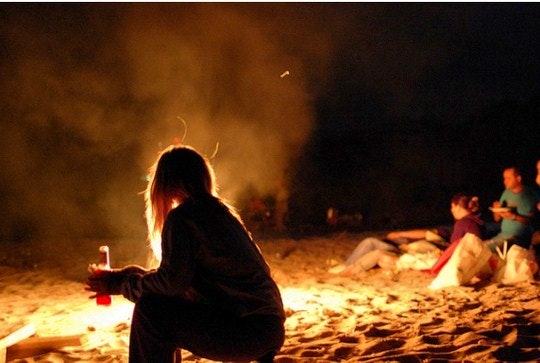With the weather getting warmer every day, the itch to get out of the city begins. To go somewhere far away from the busy roads, robots, taxi’s and smog. You glance longingly up at that unused tent in the top cupboard, and contemplate going camping over an upcoming weekend. If you’re a newbie invited along for a camping trip, don’t think that it’s all about fighting off bugs, and putting up with dirt and heat for days on end – camping for many is a much-loved, and much coverted affair.
The first time my husband and I camped together, we brought our tent, an air mattress, sheets and pillows, bug spray, our clothes, hygiene items, and a box with cutlery, dishwashing liquid, a can opener, one headlamp, a torch and some wine. We were woefully unprepared for any actual cooking – barring the evening braai. Now however, we’ve built up quite an extensive list which we keep in our camping box to check off before we head out anywhere – and this list is constantly growing and evolving as we discover we need new items.
See below for some of the items we have, some we’re still waiting to get, and some of which weren’t quite as useful as we thought they’d be. Clothing will be included in part two, along with how to camp with children. For now, read on and feel free to comment if I’ve left something out.
The Basics:
Usually known as the bare necessities for a weekend camping trip.
- Tent. Most tents from Camp World, Macro, Game and Cape Union Mart come with all the equipment you need, including a ground sheet, rain tarp, guide ropes and tent pegs – it’s always wise to bring along a few extra tent pegs, just in case the ground you’re trying to hammer them into is hard, and they bend or snap. Also, a rain sheet is handy to have on, even if there’s no rain forcast. You don’t want to have to go out into the wet and mud to stop your tent from leaking if a sudden storm rolls by.
- Comfort. A sleeping mat or air mattress works wonderfully, just ensure your chosen item will fit in the tent you have – the worst thing possible is arriving at the campsite, setting up your tent, blowing up your mattress (or pumping it up), and only then discovering you’ll be sleeping for the next week with your nose to the ceiling. Also, ensure you bring a duvet or sleeping bag with you – even though it may be the middle of summer you’ll find that evenings can get chilly.
- Light. Once your tent is set up, and your bed’s in place, hang a lantern from the ceiling if there’s space, and place your headlight or torch somewhere you won’t forget it, for when the sun starts to set. My husband and I picked up a little solar powered lantern from the Crazy Store for about R30, and it works beautifully. Also, matches and lighters fall into this category assuming you have a gas lamp, or even just for starting a fire.
The Intermediates
So you’ve got your own tent, sleeping gear, light sources and haven’t had to borrow them from friends or family. Well done. The next step is your gear and food:
- Water. No matter where you’re going, make sure you have at least 2L of water with you. This water can come in handy for everything from drinking to cleaning to cooking – and if you arrive at a campsite where there’s a problem with the water mains, you’ll be sitting pretty while others have to drive into town or boil lake water (ick!).
- Food. Food is a necessity, and though you may be able to buy majority of items needed at a shop close to the camp site, getting a few items ahead of time is prudent, just in case. A tin or two of tuna, mielies and a box of samp and beans or garlic bread comes in handy if you’ve arrived after dark, and are too exhausted to braai.
- A cooler.This should be common sense, but many people forget to grab a cooler box before leaving home and then have to beg for space in someone elses (which inevitably leads to the offending parties items being at the very bottom, and hands that freeze each time they dig in to find some grog). The cooler is useful for storing your ice bags, keeping your beverages of choice cold, as well as keeping salad items, cheese’s, and that all important milk bottle for your morning coffee, fresh.
- Box. A big ammunition or storage box works well as a table or workspace – especially if you have a soft cooler box, plus you can keep all your food and kitchen items together in it. We bought a 30L storage box from Game for around R120, and use it to keep all our dry storage goods together like cans, sugars and sauces, along with our cutlery, plates, cups and dishwashing items (inside another sealed plastic container so if it leaks it won’t affect the food). Blitz or firelighters can also be kept in small amounts in the box, while coal and wood will need to be stored seperately.
- Utensils. Apart from the usual knives, forks and spoons, don’t forget that a spatula, braai tongs, bottle opener and even chopsticks can come in handy. Skeweres are also a good item to keep in your storage box for those late-night marshmellows.
- Braai grid. Most camp sites have a demarcated braai area, while others only have a small cairn of stones as a fire pit. Either way, a braai grid comes in handy.
- First-aid kit. I can’t stress how important this is to always have. From headaches to bug spray, to calamine lotion for bug bites, to disinfectants and bandages for scrapes and burns, make sure you’re covered for all eventualities and you’ll be fine. Allergy medication can also be something to add if you’re in a flora dense camping environment.
- Trash bags. A roll of black bags, or shopping packets come in handy – to dump empty food items, tissues, empty the ash tray, etc. It’s easier to make one trip to the communal garbage bins, than have to trek there, and back each time.
The Masters:
You’ve got all the above and more in your camping kit, so here are some items you probably won’t be forgetting:
- A book, magazine, or leisure item. Yes, you know camping is about socialising, and spending time outdoors in nature, but you also know that if you’re camping for a while, you’ll need something for those moments when you have some time alone.
- Camp stove. Either a gas, propane or gel fuelled camping stove comes in very handy first thing in the morning, when you stumble around zombiefied needing that first aromatic cup of coffee. Just be warned, smaller stoves can take up to 45 minutes to heat up enough for boiling water or cooking eggs.
- Pots and pans. You can often find a complete set of camping pots and pans at places like Cape Union Mart, or Camp and Climb – and a whistling kettle is a good addition as well. Just ensure the item(s) you’re buying isn’t made of aluminium, as the metal reacts specifically to acidic foods which pits and warps it, as well as the various health concerns about the effects of aluminium on the human nervous system and the much debated (but still inconclusive) link between aluminium exposures and Alzheimer’s disease. So if you’re worried about that, then stainless steel may be a better alternative.
- Cutting board. Because you’ve learnt that using your camping box’s lid to chop vegetables on, is never a good idea.
- Plastic containers. A few lunch box sized plastic containers come in handy for storing extra cooked meat, or the last of the salad. A larger container can be used to store the dirty plates and utensils so you don’t awake to bugs and flies everywhere.
- Camping chairs. These are always nice to have so you aren’t sitting on the damp ground – and some brands even have a handy cup holder, so you don’t need to worry about the little ones running around and possibly knocking your beverage over.
Tips:
- Some other handy food items include trail mix, cup-a-soup, and meal-in-a-bag, for those times you’re jut not up to cooking late into the night, or even just need a snack on the drive through to the camp site.
- Glow sticks/snap sticks are a great source of mild light late at night, and younger children are generally fascinated by them. Grab a pack and keep one or two handy.
- A poncho is a lightweight addition that often comes in handy.
- A roll of tin foil works for cooking mielies, vegetables and garlic breads.
- Bandanas and/or a sarong can be used as a shawl, scarf – and on those really hot days, can be soaked in water and wrapped around you to combat the heat.
- Toilet paper, and a box of tissues. Most camp sites have ablution facilities with these items, others don’t.
- Plastic plates are always good, but paper plates take the stress out of washing up at the end of the night.
- A wind-up radio is a useful item for listening to music or sports, if you’re at a campsite with no power points.
- An extension cord and multi-pronged plug is a must for charging your gadgets, at camp sites with power points.
- Ensure your pump is packed for blowing up your air mattress.
- An old, small mat can be put on the inner opening, to prevent sand or grass being trecked in.
- A two-man tent is great for a short camping trip, however my husband and I prefer our 4-man tent, as there’s plenty of room to keep our storage box, clothing and cooler box.
- A peaked cap for the sun, and a beanie for the evenings.
- Instant potatoes or Smash are good for a quick and filling side. Just add hot water.
- A spare blanket comes in handy as a picnic rug, a towel if need be, a make-do sun shade, and of course its original use, to keep you warm in the cooler hours.
- Cards and board games are good for rainy days.
- Don’t forget your camera, so you can snap the happy group together.
If you’d like a very extensive list, stop over at New England Camper’ which also has recommended camping food items. If you feel there are any imperative items that have been missed out on, please leave a comment with what and why. If you’re looking for reputable camp sites, check out our website for a list of great South African accommodations.





